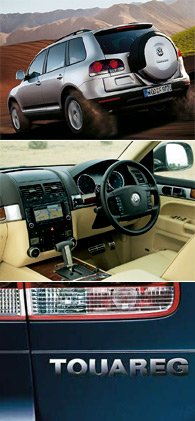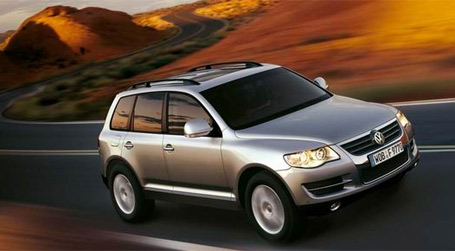Volkswagen is the true number 1 carmaker in the world now. While it may read as number three in official sales charts now; becoming the world's biggest selling automaker could become a reality in a couple of years.
The German manufacturer bucked the trend to post an increment of sales and profits for 2008 despite the saga caused by the buy-out from Porsche. Volkswagen has gone from strength to strength with a surge of new models; there is still a waiting list for the mid-size SUV Tiguan and the resurrection of the iconic Scirocco.

The Volkswagen Touareg reminds me of a classless car and in many ways a cool SUV. It may share the mechanics with the Porsche Cayenne and the Audi Q7, but the Touareg has seldom been labeled an elitist mobile. While priced reasonably, it has never called cheap. The Touareg has become a socially agreeable SUV, and more importantly, it has the goods to back it up with an enduring exterior styling.
Since Jul 1, Volkswagen Singapore has introduced diesel engined passenger cars as the reformed Road Tax structure is now friendlier to diesel passenger cars. The Touareg range sees the addition of the two diesel variants, the 3.0 TDI and the planet-moving R50 to the local line up. We will talk about the petrol variant 3.6 FSI and the diesel-engined 3.0 TDI, as the two closely priced models offer consumers different pros and cons.
Performance
In general, diesel engines are heavier than petrol engines of a similar power output. The weight penalties are blamed on the longer stroke length, heavier pistons and connecting rods the diesel engines needs to have in order for combustion of diesel to take place. In the case of the two Touaregs, the petrol-engined TSI certainly has the clear edge when it comes to power delivery as acceleration is crisp and prompt as the engine revs with ease, while the TDI suffers from turbo lag with little progress below 2000rpm. However, the surprise is that the diesel-powered Touareg snatches victory on paper, as it posts a quicker time in the century dash, 8.3 secs versus 8.6 secs. The rattling still exists for the turbo-diesel at idle, but once on the move, the diesel engine settles into a hush and refined affair, even while stationary in the traffic, only a distant hint of diesel clatter can be detected. In spite of the seductive acoustics of the petrol V6 roar, the better power plant for the Touareg, in terms of performance and refinement, is clearly the 3.0 TDI.
Ride and Handling
Volkswagen's Touareg has never been a driver's car, and even among luxury SUVs, the Touareg is usually class competitive at best. Prime suspect for ruining the driving experience would be the steering. Regardless of the choice of engine, the tall German barge offers zero feedback from the light steering setup; which can be disappointing, given that both Touaregs possess decent handling abilities, as the body roll is kept under control. For this comparison, the diesel powered 3.0 TDI offers a better balance on the roads, as the lighter petrol engine 3.6 FSI dives with greater drama during acceleration, braking and even cornering. Ride quality on the Touaregs are competent, as it is never harsh or unrefined. The test units handed to Fridae wore different size rims. The petrol-engined TSI had only 17" alloys while the TDI had a sexier set of 18" wheels. The TSI with the smaller wheels rode better for sure, however the trade off would be appearance. 18" alloys is definitely the minimal size for the Touareg. Again the diesel engine-Touareg TDI shades the petrol sibling. Subtle as the difference might be, the TDI in my opinion offers the better handling and a more civilised ride.
Dollars and Sense
At current fuel prices, it would take S$176 to fill up 100 litres of premium 98 RON which the 3.6 FSI demands from Shell Singapore before discount. On the other hand, the 3.0 TDI would set you back at S$143 per pop. And in support the diesel's case as the smarter buy between the two Touaregs, the range is approximately 1000km versus 700km in the petrol Touareg. With the revisions made to the road tax computations, the 3.6 TSI petrol Touareg sets you back at S$3,983 per year, while the diesel TDI's damage is S$6,262. The diesel Touareg's tax premium can be corroded by just clocking a mileage of 7000km per annum without even considering the lower list price of the diesel Touareg at S$4,500. Even Paris Hilton would know which of the two would make more financial sense.
In Conclusion
Volkswagen obviously knew that the 3.0 TDI is the better everyday car as it offers better performance and smarter financial sense. The delayed introduction would be the fault of Singapore Land Transport Authority for not being swift to join the diesel wagon sooner.
| Volkswagen | Volkswagen | |
| Model | Touareg 3.6 FSI | Touareg 3.0 TDI |
| Engine | 3,597cc | 2,967cc,24-Valves, V6 |
| Transmission | 6-speed Automatic Transmission, Four Wheel Drive | 6-speed Automatic Transmission, Four Wheel Drive |
| Max. Power | 280bhp@6200rpm | 240bhp@4000-4400rpm |
| Max. Torque | 360nm@2500-5000rpm | 550nm@2000-2250rpm |
| Top speed | 218 km/h | 209 km/h |
| 0-100 KM/H | 8.6 secs | 8.3 secs |
| Fuel Economy | 7.4 km/L (combined cycle) | 9.9 km/L (combined cycle) |
| CO2 Emissions | 317 g/km | 262 g/km |
| Dimensions (L x W x H) / Weight | 4,754mm x1,928mm x 1,726mm | 4,754mm x 1,928mm x 1,726mm / 2,225 Kg |
| Price with COE* | $187,800* | $183,300* |
| Road Tax | $3,983 / annum | $6,262 / annum |
*Prices quoted are indicative of prices in Singapore. Please contact your local distributor for prices in your country.
P.S. The next phase of diesel passenger cars are expected to come from the French PSA group. Peugeot's diesel hybrid is set to debut in the forecoming Peugeot 3008 within two years.












 Printable Version
Printable Version











Reader's Comments
Be the first to leave a comment on this page!
Please log in to use this feature.